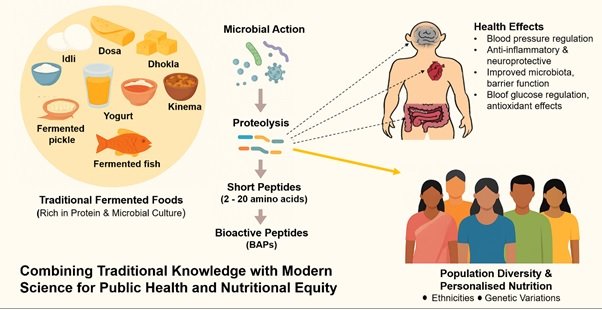Inside BENEO’s new pulse plant: pioneering sustainable protein from faba beans
The bioactive peptides (BAPs) or short protein fragments consisting of 2 to 20 amino acids that they contain can regulate blood pressure, blood sugar, immunity, and inflammation
A recent study conducted by the Institute of Advanced Study in Science and Technology (IASST), Guwahati, an autonomous institute of the Department of Science and Technology (DST), emphasises the health benefits of traditional fermented foods. They showed that the bioactive peptides (BAPs) or short protein fragments consisting of 2 to 20 amino acids that they contain can regulate blood pressure, blood sugar, immunity, and inflammation.
The study published in Food Chemistry (2025), led by Prof Ashis K Mukherjee, Corresponding author and Director IASST, Dr Maloyjo Joyraj Bhattacharjee, Dr Asis Bala, and Dr Mojibr Khan showed that foods such as yogurt, idli, miso, natto, kimchi, and fermented fish contain high levels of these peptides.
These short peptides, formed during fermentation, interact with biomolecules through electrostatic forces, hydrogen bonding, and hydrophobic interactions to exert antimicrobial, antihypertensive, antioxidant and immune-modulatory effects.
This can influence cardiac function, immune response and metabolic health. However, their bioavailability and effectiveness vary across populations due to genetic polymorphisms, gut microbiota composition, dietary habits, and health conditions. Gene variants in ACE or IL-6 may affect individual responses to these peptides. This data emphasises the necessity for precision nutrition and targeted health interventions customized to the diverse Indian population.
The research published in the Journal Food Chemistry, can address challenges such as variability in fermentation methods, peptide stability and interactions with the microbiota.
The study advocates incorporating traditional fermented foods into public health initiatives. It emphasizes the need for omics-based (biological research that utilise high-throughput technologies to analyze large sets of molecules) research and innovation in rural food systems to establish India as a global leader in personalized nutrition.

